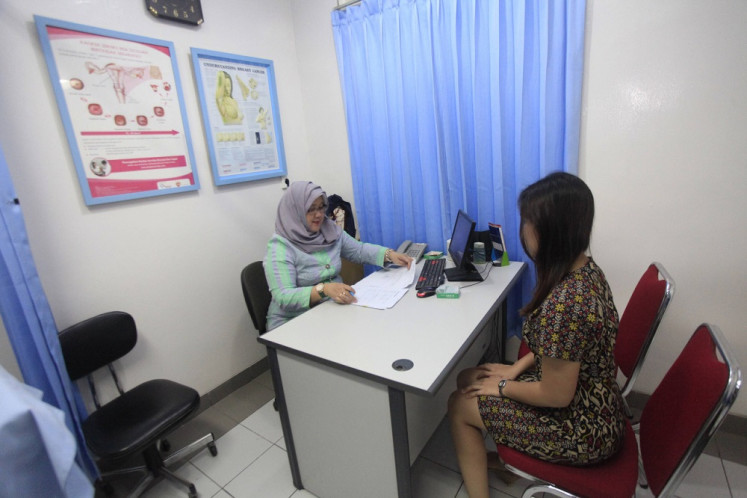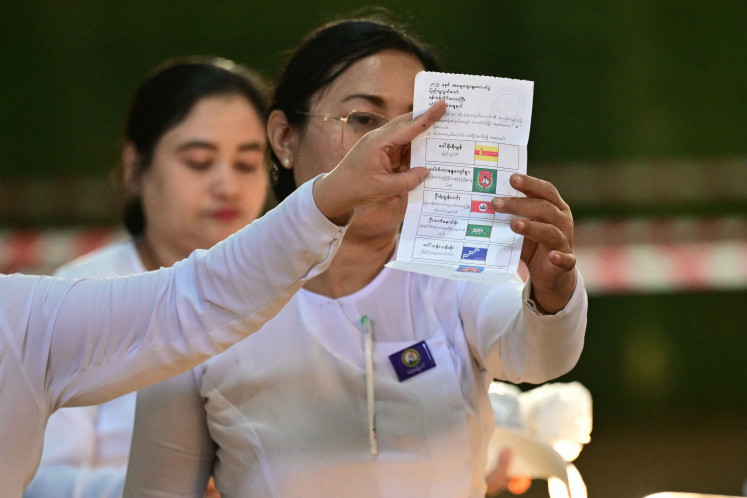Popular Reads
Top Results
Can't find what you're looking for?
View all search resultsPopular Reads
Top Results
Can't find what you're looking for?
View all search resultsIndonesia’s democracy alive, but needs more kick
Indonesia’s democracy is not perfect, far from it, but it is wrong to describe it as stagnating or retreating. Indonesia’s democracy is very much alive but yes, it needs a lot more kick. #commentary
Change text size
Gift Premium Articles
to Anyone
 Incumbent President candidate Joko Widodo greets his supporters at the Jakarta Theatre, Central Jakarta, April 17, 2019. Widodo was on track to be re-elected as president of the world's third-biggest democracy on April 17 with pollsters giving him a wide lead over rival Prabowo Subianto, an ex-general. (JP/Seto Wardhana)
Incumbent President candidate Joko Widodo greets his supporters at the Jakarta Theatre, Central Jakarta, April 17, 2019. Widodo was on track to be re-elected as president of the world's third-biggest democracy on April 17 with pollsters giving him a wide lead over rival Prabowo Subianto, an ex-general. (JP/Seto Wardhana)
S
aturday’s symbolic reconciliation between incumbent President Joko “Jokowi” Widodo and Prabowo Subianto, respectively the winner and loser of the 2019 presidential race, has effectively sealed the most fiercely contested election the nation has seen.
It is also a testament that Indonesia’s functioning democracy and the presidential and legislative elections reflect, in some measure, the people’s will in who should represent and lead them for the next five years.
This says a lot for the world’s fourth most populous nation, especially at a time when democracy is in retreat almost everywhere, including in some established liberal democracies.
Indonesia’s democracy is not perfect, far from it, but it is wrong to describe it as stagnating or retreating — the theme of this year’s conference on Indonesia at an Australian university.
There has never been any shortage of naysayers over the last 20 years predicting the collapse of Indonesia’s democracy, but in making it the theme of the conference, the university has essentially condemned the country as a failing state on the verge of returning to a dictatorship. And the conference will no doubt attract like-minded scholars, both Indonesians and non-Indonesians, to further reinforce this belief.
They couldn’t be more wrong. Indonesia’s democracy is very much alive but yes, it needs a lot more kick.
There has been some regression in areas like human rights and guaranteeing basic freedoms, but please cut us some slack.
Indonesia’s march to democracy that began in 1998 has never been one of steady progression, but rather a case of two steps forward and one step backward.
There have been some setbacks in recent years for sure, but this year’s election has proven that the majority of Indonesians still believe in democracy and all the values that come in the package.
Holding the fifth free and fair general election since it ushered democracy in 1998 is quite an achievement for a country the size of Indonesia.
Billed as the biggest one-day election in the world, the 2019 presidential and legislative elections saw 190 million registered voters, over 800,000 polling stations run by more than 7 million volunteers, and a voter turnout of more than 80 percent.
Tragically, this year’s election was also marked by the deaths of more than 600 polling station workers — most of who died of exhaustion. The figure is unusually high, but had nothing to do with the election violence. Eight people were killed in the May 21-22 election riots in Jakarta after the electoral commission announced the results, but we have to credit the police with quickly restoring order and keeping the toll low.
Contrary to what many Indonesianists here and abroad claim, Islam was never a major factor in the election.
Neither of the presidential candidates used religion in their campaigns, and most political parties avoided the issue completely. The few Islamist parties that used Islam fared poorly at the polls, indicating that most Indonesian voters are not interested in religion.
Identity politics certainly played a role, and candidates and parties gained votes here and there by playing up Islam. But now that the election is over, we can expect less use of identity politics. One or two groups will likely continue to play it up, but it has little consequence to a nation now eager to move on to start addressing the real bread-and-butter issues.
Indonesia is not the only democracy struggling with the rise of identity politics, but it has done better than most — at least, going by the election results.
Indonesia was singled out for criticism because of the Islamic factor, since many continue to believe or to want to believe that Islam and democracy are incompatible.
For the last 20 years, Indonesia has proven that Islam and democracy are compatible, and the 2019 election has reaffirmed that Indonesia is the world’s largest democracy among Muslim-majority nations.
Democracy is here to stay, even as the nation becomes more pious and conservative. But don’t take my word for it: Read “Why religious tolerance won in Indonesia but lost in India — it turns out pluralistic nationalism isn’t enough” in Foreign Affairs magazine’s July edition.
Taking a myopic view of Indonesia and comparing it as it was five years ago, as many want to do, you will certainly see many instances of regression.
But compared to where the nation was 20 years ago and to many other countries in the region and in the world, including older and more established democracies, Indonesia is not doing too badly.
The 2019 election, with all its imperfections, has given democracy another five-year lease on life. All the problems it faces, including its failure to protect basic rights, rising intolerance and many other challenges you can think of, it will deal with and resolve through the democratic process.
Democracy is and will always be a work in progress in Indonesia; it is not a work in regress.










